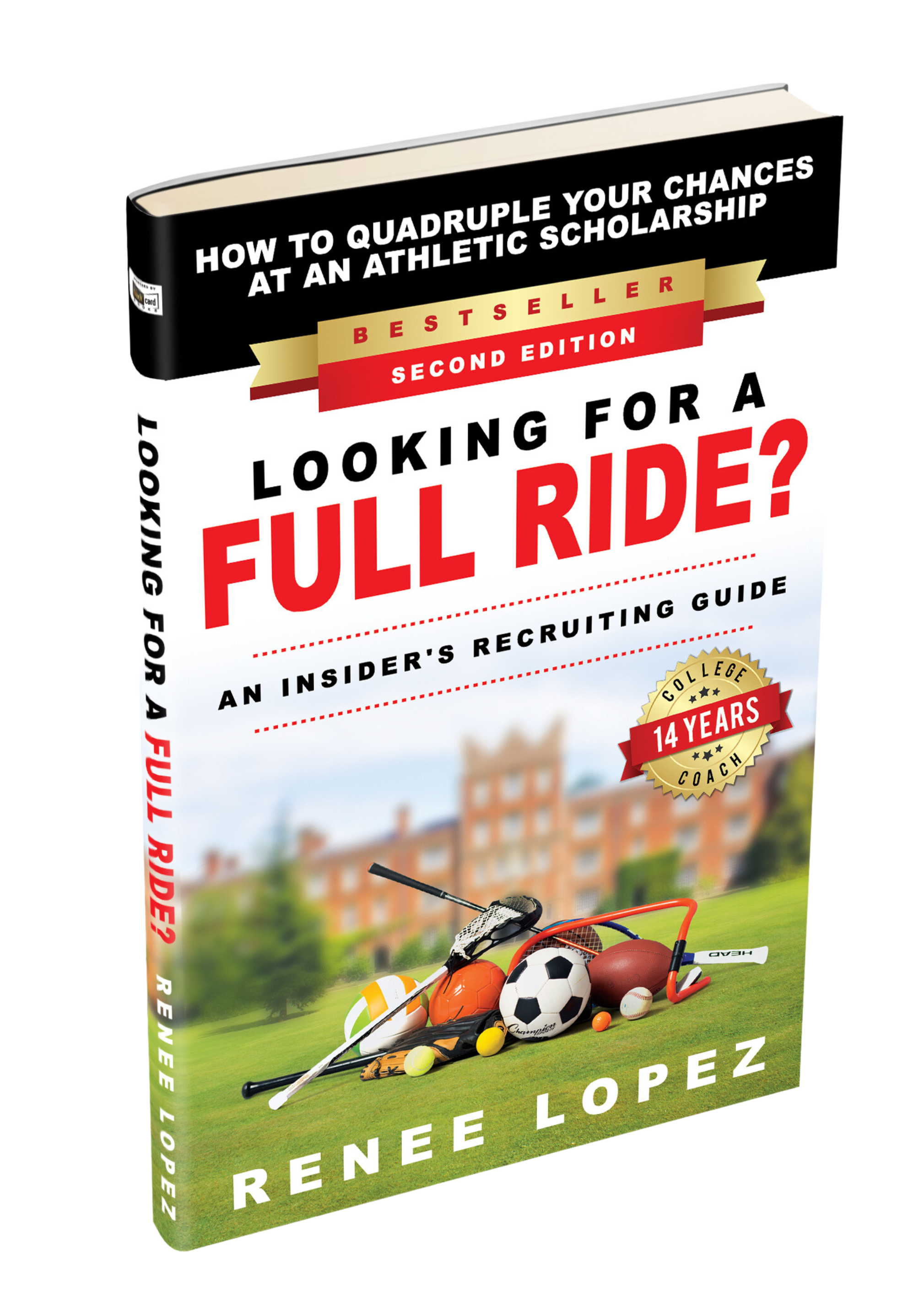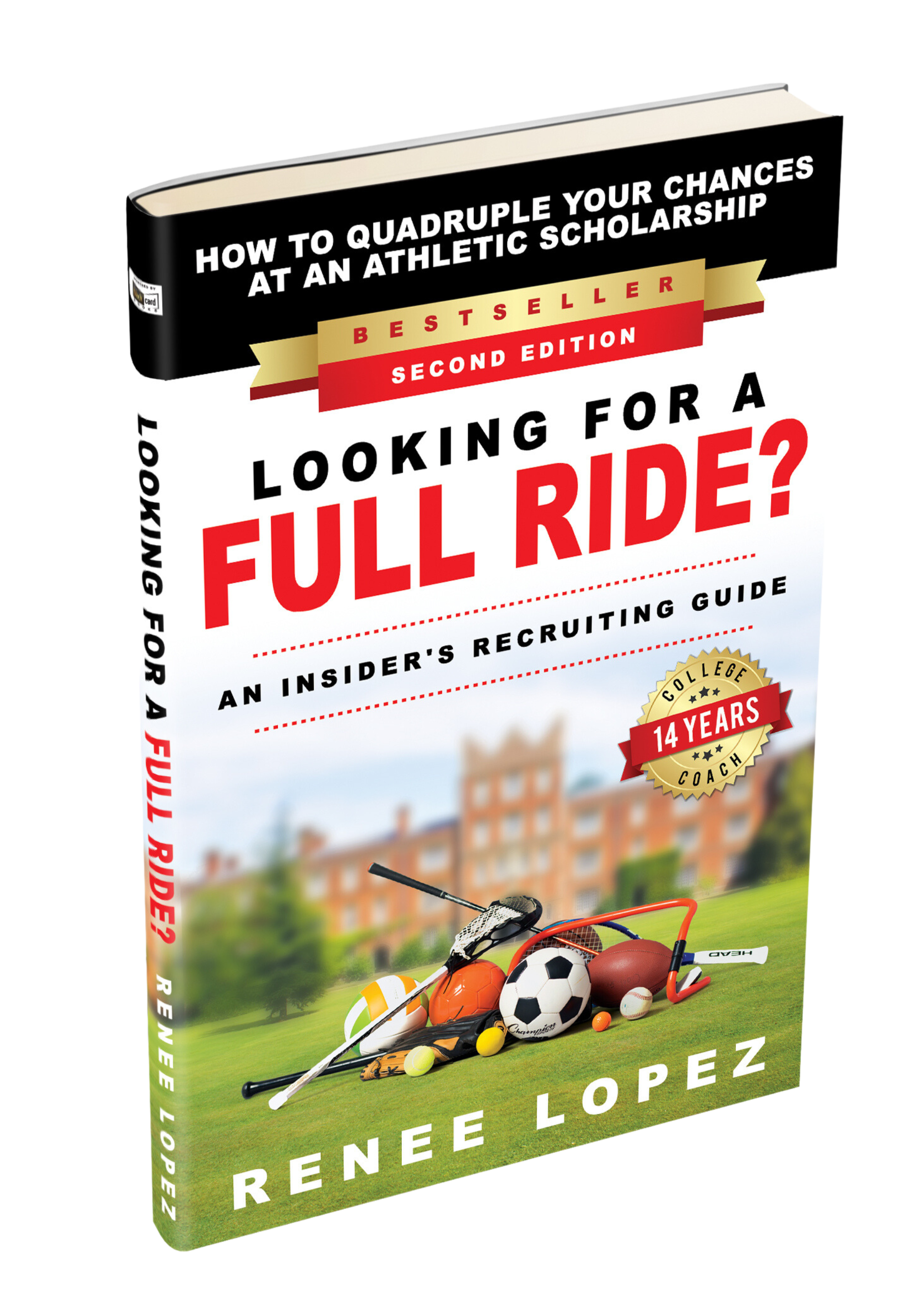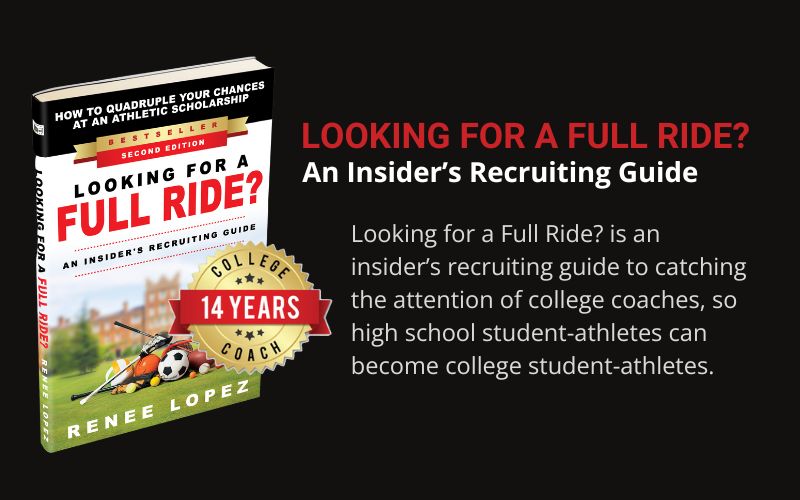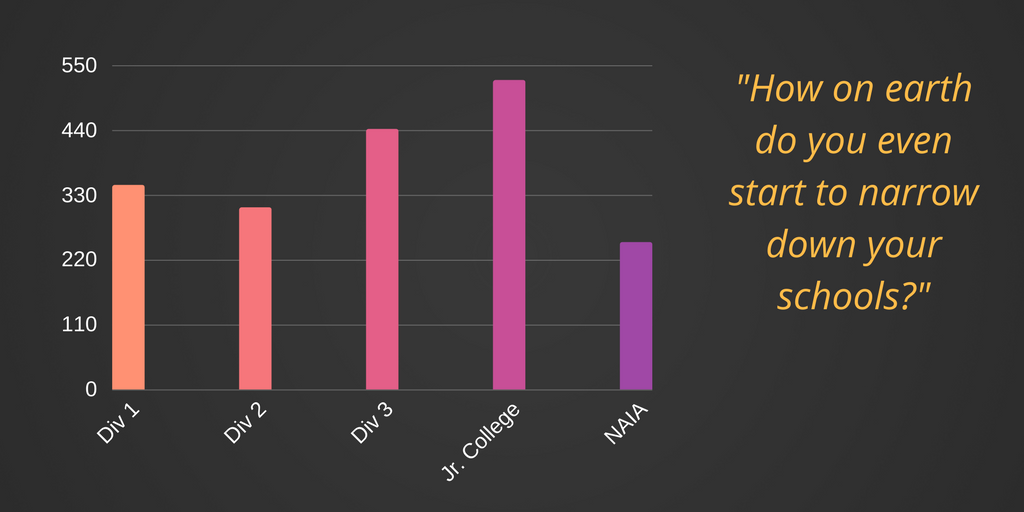“Where should I start in the college recruiting process?”
“How do I pick out which college coaches to contact in hopes of an athletic scholarship?”
“How do I know if schools are the right fit for my career?”
Over the past 2 weeks, I have heard these questions in various high schools, sports clubs, online forums, and conferences. Some of these questions came from concerned parents, while others came from overwhelmed high school students. After doing a coaching education session a few weeks ago, many also asked how they could help their student-athletes to pinpoint potential colleges. Having been a college coach for 14 years at various size universities and athletic divisions, I want to provide a few factors to consider while strategically planning out the college recruiting process.
In my book, “Looking For A FULL RIDE?: An Insider’s Recruiting Guide,”  I interviewed 65 college coaches and athletic directors to get their perspective on the college recruiting process. As we discussed in our recent blogs, it is important to prepare video for college coaches, understand what coaches are looking for beyond the X’s & O’s, as well as understand the right questions to ask a college coach.
I interviewed 65 college coaches and athletic directors to get their perspective on the college recruiting process. As we discussed in our recent blogs, it is important to prepare video for college coaches, understand what coaches are looking for beyond the X’s & O’s, as well as understand the right questions to ask a college coach.
But as you plan out your video and campus visits, how on earth do you even start to narrow down between the 347 NCAA Division I, 309 Division II, and 442 Division III colleges? In addition, what about the over 525 Junior Colleges and 250 NAIA programs? I offer up 3 areas to focus to find the right program for you:
1. Academic & Social Atmosphere
While choosing a specific major can be a daunting task, it is okay to instead ask yourself what are 2-3 subject areas you enjoy and might possibly want to continue to pursue in college? Doing some basic internet searches can yield multiple sources to narrow down schools with your potential major. While many liberal arts colleges offer pre-med, education, and business degrees, you may need to do a bit more research to find colleges with marine biology, engineering, athletic training, graphic design, or wildlife rehabilitation. Knowing a few subject areas that interest you can help you keen in schools to do further research on their athletic programs.
 Are you a person who needs to know your professors well in smaller class sizes or would you be able to handle a lecture hall for your introductory courses with possibly 100-500 students in the class? While student-athletes as a whole tend to have higher GPAs than the average student, it is vital for you to think through the size of classrooms in which you would excel.
Are you a person who needs to know your professors well in smaller class sizes or would you be able to handle a lecture hall for your introductory courses with possibly 100-500 students in the class? While student-athletes as a whole tend to have higher GPAs than the average student, it is vital for you to think through the size of classrooms in which you would excel.
It’s also important to think through your capacity to become involved in other extra-curriculars offered outside of your sport such as Fellowship of Christian Athletes, a rock-climbing club, serving in student-government, or writing for the school newspaper. Some athletic schedules will allow for this, while others will not. Finding a fit academically and socially really boils down to what type of environment you can best succeed in: Do you want to be a large fish in a small pond vs. a small fish in a large pond?
2. Career opportunities
 Exploring what opportunities the school offers for internships, studying abroad, and other practicum experiences is also an essential step in researching universities. Is the college connected to a major corporation in the area and regularly place their business majors in internships? If you want to go on to medical school, what practicum experiences do they offer their pre-med majors? Are there options to enhance your journalism skills through a local tv or newspaper station? If you want to major in sports management, can you get experience in their athletic department? Investigating these options prior to being offered a roster spot can help you decipher which programs might help you take the right steps for your career.
Exploring what opportunities the school offers for internships, studying abroad, and other practicum experiences is also an essential step in researching universities. Is the college connected to a major corporation in the area and regularly place their business majors in internships? If you want to go on to medical school, what practicum experiences do they offer their pre-med majors? Are there options to enhance your journalism skills through a local tv or newspaper station? If you want to major in sports management, can you get experience in their athletic department? Investigating these options prior to being offered a roster spot can help you decipher which programs might help you take the right steps for your career.
Some institutions located in smaller towns may have great connections with local businesses, but may not have as many options for getting experience. Large cities may offer a wealth of opportunities. but without connections from the college, may be extremely competitive. As you think through your career beyond athletics, it’s important to investigate areas that could add to your resume!
3. Location
 While the size and setting of the university is very important regarding career opportunities, the physical location of the school is extremely important as well. If you play an outdoor sport, what type of weather will you want to be playing in? Having coached college soccer in both Florida humidity and Colorado’s high altitude, the weather can significantly impact your daily life.
While the size and setting of the university is very important regarding career opportunities, the physical location of the school is extremely important as well. If you play an outdoor sport, what type of weather will you want to be playing in? Having coached college soccer in both Florida humidity and Colorado’s high altitude, the weather can significantly impact your daily life.
As you think through the location of potential schools, it is crucial to know if you would need a car to get around on campus or in the local city. Some larger schools will have bus transportation to get to a grocery store, the mall, or even those internships described above. However, it’s also important to analyze if freshmen are even allowed to have cars on that campus (or if there is even parking spots available for them!)
Finally, it is also vital to think through how far you want to be from your hometown. For me, I wanted to be close enough for my family to still see me play, but far enough away where I had to live on campus. It is important for student-athletes to ponder how far they really want to be from home, which often impacts how often families could travel to see your competitions and how often you are able to go home as well. Having had numerous student-athletes play for me from across the country, this is one area I would caution student-athletes of narrowing down too early in the recruiting process. Two student-athletes who became All-Americans on my teams had athletic scholarship offers closer to home, and (lucky for me), found a better overall fit for them at a school farther away where they excelled!
As you start to think through these 3 factors in regards to choosing a school, I encourage you to take “The Broken Leg Test”. I use this scenario in consulting with families as they start to think through important factors regarding college. This simply means if you were injured on the first day of your athletic season and were sidelined, would the school still be the right fit to propel you into your career beyond athletics after 4 years?
Once you have narrowed down these factors for you in choosing a college, I would encourage you to keep an excel document as it becomes a lot of information to remember and compare. Using this criteria and your best friend, Google, you should start to email the college coaches that match your desires. For Strategies To Emailing A College Coach, visit our Special Report.
Final Bonus Tip: Coaches love to hear in their emails some of the reasons you chose to contact them beyond athletics. Describe each of the factors in your initial email to them and you will win over some major brownie points as it demonstrates to them your maturity in making a major life decision by prioritizing academics first!
Would you like help with the college recruiting process?
1. Go to www.lookingforafullride.com to get your FREE Report: Strategies to Emailing A College Coach.
2. Want some help with the recruiting process? Join some of our 9 Facebook Groups:
- Parents of High School Student Athletes Walking Through The Process (All Sports)
- Beyond Xs & Os 4 HS Athletes: Health, Recruiting, Team Building, Mental Training (All Sports)
- Athletic Recruiting Education for Principals, AD's, and Counselors (All Sports)
- Club/HS Coaches Learning College Recruiting Process (All Sports)
- Play College Soccer (Soccer Specifically)
- College Recruiting for GK's (Soccer Specifically)
- Mindset & Leadership Lessons for Athletes, Coaches/Teachers, & Business Leaders (All Sports & Business Leaders)
- Positive Team Building for Pro, College, HS & Youth Coaches (All Sports)
- Christian Competitors (Coaches & Athletes Serving Christ @Field/Court/Gym) (Sports Ministry for All)
3. Would you like her to do individual consulting with your family to get an insider’s perspective?
Email info@lookingforafullride.com for more details.
4. Did you know Coach Renee Lopez can come to your school or sports organization?
Email info@lookingforafullride.com for more details.
Coach Renee Lopez

As a 17 year coaching veteran, Renee Lopez is a recruiting expert for high school student athletes. She uses her NCAA Division I, II, and NAIA Head Coaching experience to help families navigate the recruiting process to be identified by college coaches and help them find the right “fit” for playing at the next level.
She presents recruiting seminars across the country, has recently been featured on ESPN Radio, and is the author of the book, “Looking For A FULL RIDE?: An Insider’s Recruiting Guide” where she interviewed 65 college recruiters across all sports and college levels.
She also does private consulting for student-athletes and their families to help in understanding the often daunting process of recruiting. (See one family’s testimonial.) If you are looking for help in the college recruiting process, please email Coach Renee Lopez at info@lookingforafullride.com.

